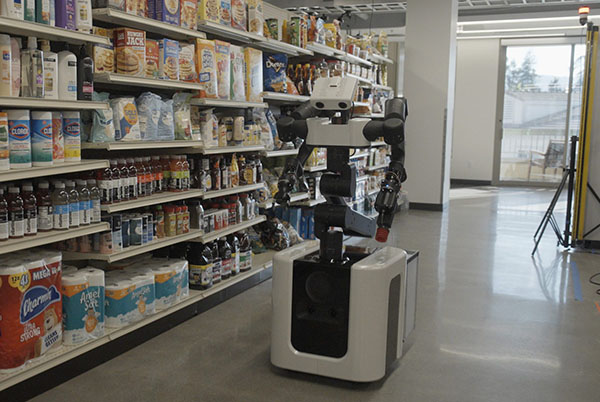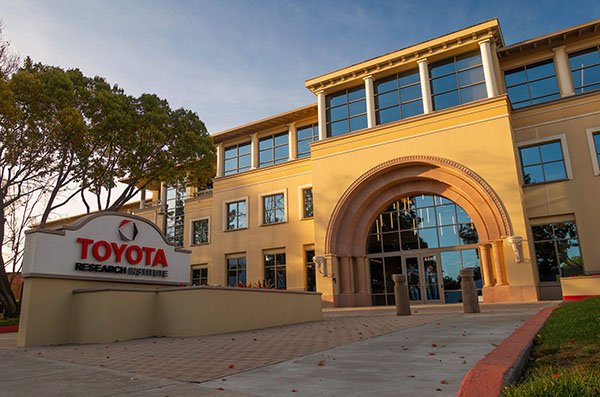Toyota Research Institute Provides a Peek Into Its Work to Solve Society’s Biggest Challenges
Top researchers shared their work on addressing aging populations, climate change, and human understanding during the Toyota Research Institute Expo.
Toyota Research Institute today opened its doors for the first time to members of the media to showcase the research taking place at its headquarters in Silicon Valley. During the TRI Expo, Gil Pratt, the company’s CEO and chief scientist at Toyota Motor Corp., explained the institute's approaches to challenges including aging populations, climate change, and human understanding.
“In the 1930s, Toyota made a huge leap by expanding from manufacturing textile looms to building cars,” said Pratt. “TRI’s mission is to discover the next technological leap that will transform Toyota’s business.”
“We are explorers researching ways to make cars better, but we’re also discovering what mobility may mean beyond cars,” he added. “We believe that our high-risk, high-reward research approach can unlock the next, big breakthrough for Toyota and our customers around the world.”
Founded in 2015, Toyota Research Institute (TRI) conducts research to advance energy and materials, human-centered artificial intelligence, human interactive driving, machine learning, and robotics. TRI said its researchers are developing technologies to amplify human ability, focused on improving safety and sustainability. The automaker's unit has offices in Los Altos, Calif., and Cambridge, Mass.
Toyota Research Institute shows off its research
During the expo, reporters toured TRI’s headquarters and learned “how its research explores the frontier where the risks and rewards are highest.”
Attendees were able to experience TRI’s Driver-in-the-loop Motion Simulator, a high-realism, immersive driving experience created to enhance the interface between human drivers and autonomy.
Reporters also saw firsthand various research vehicles built to explore ways to make cars safer in the future. The tour also included a close-up look at the institute's advanced robotics laboratory.
TRI described its five core research areas – energy and materials, human-centered AI, human interactive driving, machine learning, and robotics. It outlined why these pursuits were selected, how they strengthen one another, and how they address societal problems.
- Robotics is unlocking robotic capabilities that amplify and empower humans, at home and at work.
- Energy & Materials uses AI to accelerate the breakthroughs needed to build safe, affordable, high-performing zero-emission vehicles.
- Human-Centered AI is creating new human-AI capabilities that enhance human understanding to advance collective well-being.
- Human Interactive Driving amplifies human capabilities and puts the human at the center of the driving experience.
- Machine Learning is training algorithms to adapt and change on their own for the benefit of humanity.

TRI leaders describe their vision in panel discussion
In a panel discussion led by Brian Cooley, technology commentator, the leaders of TRI’s five research divisions revealed what they hope to discover and shared how their work connects to Toyota’s mission of “producing happiness for all.”
“Robotics is a powerful tool that can be used to amplify human ability rather than replace it – whether it's assisting people in their homes or at work, we want to empower people to use robots to help accomplish their tasks,” stated Max Bajracharya, senior vice president of robotics at TRI.
“We’re trying to solve one of the most complex challenges of our time: how to move people without relying on fossil fuels,” Brian Storey, senior director of energy and materials at TRI. “We’re using AI and other technologies to discover new materials and make other breakthroughs to power the future.”
Charlene Wu, TRI's senior director of human-centered AI, added: “Bringing together a team of renowned research scientists from behavioral science, machine learning, and human-computer interaction, our team develops tools and frameworks that allow us to understand human behavior. Once we have that understanding, we work to develop AI systems to augment human decision-making.”
“As technology and consumer preferences in mobility change rapidly, we envision a future where your vehicle intelligently uses AI to amplify human capabilities, creating a better driving experience,” noted Avinash Balachandran, director of human interactive driving. “Whether it’s supporting drivers in difficult situations or interacting with drivers to improve their skills over time, we seek to build AI that collaborates with people to make driving safer and more fun for everyone.”
In addition, Adrien Gaidon, TRI director of machine learning, asserted: “Machine Learning underlies everything we do at TRI. We want to discover and develop useful learning principles that enable machines to learn safely, at scale, and with minimal supervision. These machine learning principles aim to support the next generation of intelligent machines.”
Article Topics
Toyota News & Resources
Ranking the World’s 10 Biggest Supply Chains Toyota Material Handling | 360 Support: Technicians Video Reverse Logistics Best Practices Toyota Doubles-Down on Zero Emissions Heavy-Duty Trucks Toyota Environmental Challenge 2050 Transitioning To Zero-Emission Heavy-Duty Freight Vehicles Toyota Puts Zero Emission Fuel-Cell Semi Truck to Test at The Port of Los Angeles More ToyotaLatest in Supply Chain
C-Suite Executives Investing Heavily in Generative AI Trucking Industry Pushes Back on Government’s Electric Mandates Senators Take Aim at Amazon with Warehouse Worker Protection Act Maersk Sees Silver Lining in Red Sea Shipping Challenges Happy Returns Partners With Shein and Forever 21 to Simplify Returns S&P Global Market Intelligence’s Rogers assesses 2024 import landscape Frictionless Videocast: AI and Digital Supply Chains with SAP’s Darcy MacClaren More Supply Chain










